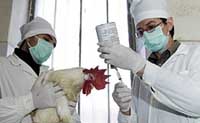Dead birds being tested for H5N1 in two districts near Moscow
Tests were being carried out on poultry found dead in several new areas in suburban Moscow to determine whether the birds had died of the same H5N1 bird flu strain that has sickened birds in several regions around the Russian capital, officials said Tuesday.

Overall, at least 190 domestic birds have died since Feb. 10 on the outskirts of Moscow, and the presence of H5N1 so far has been confirmed in four areas, Russia's Emergency Situations Ministry said in a statement.
An additional 75 birds were found dead Tuesday in the town of Ramenskoye east of Moscow, the Interfax news agency reported, citing regional veterinary officials.
Another 20 poultry deaths were registered in the village of Yershovskoye in the western Odintsovo region and seven birds died in the village of Solodovo in the northwestern Volokolamsk region, said Nikolai Vlasov, a top official with the federal agriculture oversight agency Rosselkhoznadzor, according to RIA Novosti news agency.
Vlasov said it would take a few days to identify the cause of the poultry deaths, but added that the birds which died had been purchased at the same animal market just outside Moscow that has been the source of birds infected with H5N1 in other districts around the capital.
The market has remained closed for disinfection. Officials said the virus strain was of a highly virulent subtype and could have originated in Asia, the Caucasus region or the Balkans.
Poultry that died belonged to individuals who had bought birds recently. Many people in the Moscow suburbs keep small numbers of chickens and other farm animals in their yards.
Officials said several people who had been in close contact with the dead birds were taken in for medical observation, but no health problems had been reported.
No human cases of bird flu have been reported in Russia, which had its first reported cases of the H5N1 strain in Siberia in 2005. Outbreaks have since occurred farther west, but mostly in southern areas far from the capital.
Bird flu cases were registered in 93 towns or settlements in Siberia and southern Russia last year, according to official statistics. The country's first outbreak this year was registered last month in the Krasnodar territory, an agricultural region near the Black Sea, reports AP.
Since it began ravaging Asian poultry farms in late 2003, the H5N1 strain has killed at least 167 people worldwide, according to the World Health Organization.
Although it remains difficult for humans to catch, health authorities across the world are monitoring the strain out of concern it could mutate into a form that easily spreads from person to person and spark a pandemic.
Subscribe to Pravda.Ru Telegram channel, Facebook, RSS!





